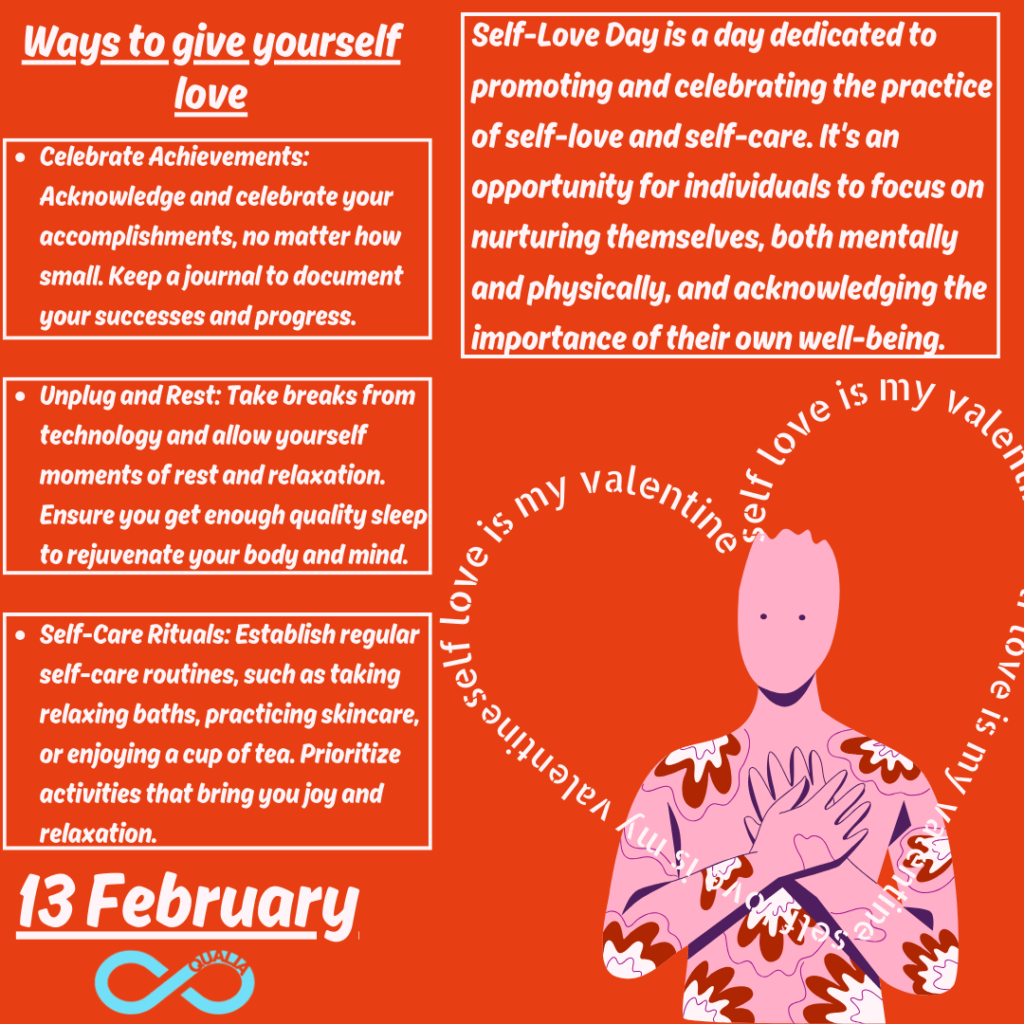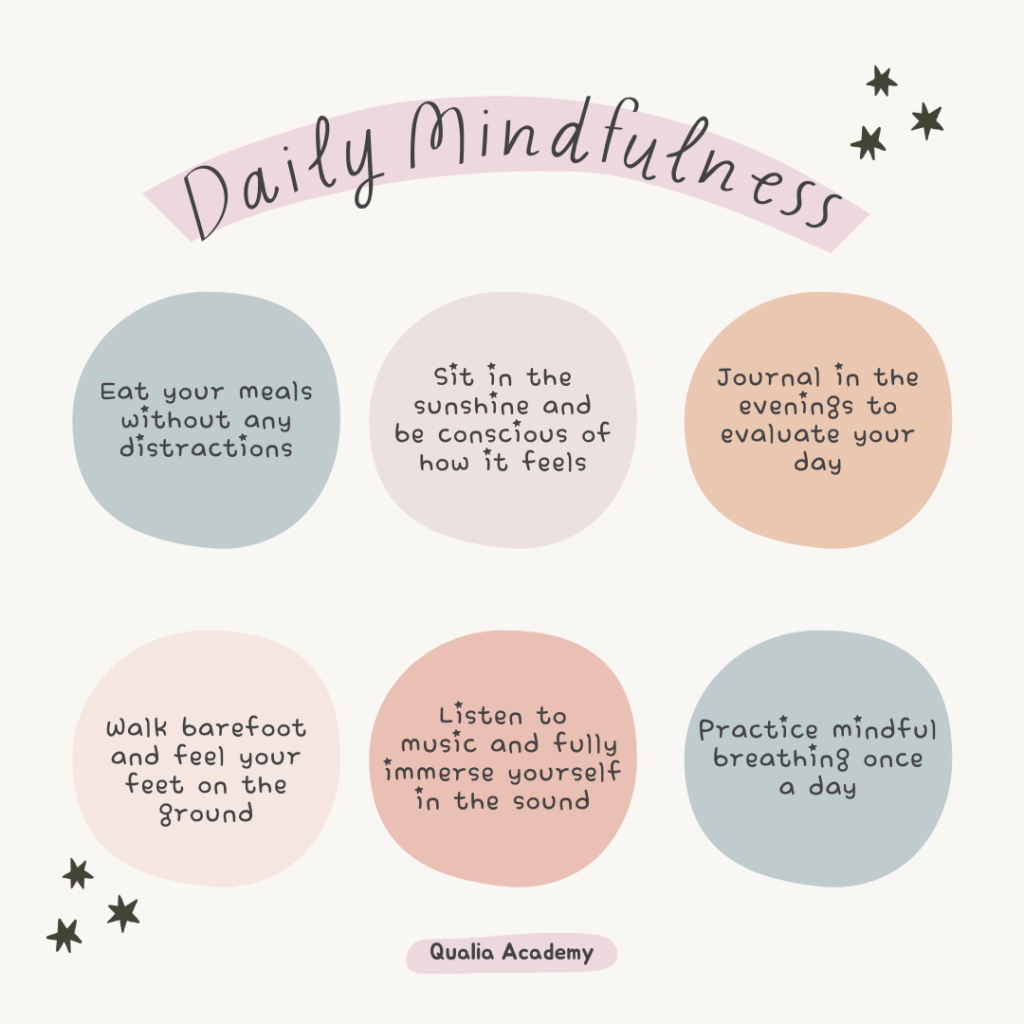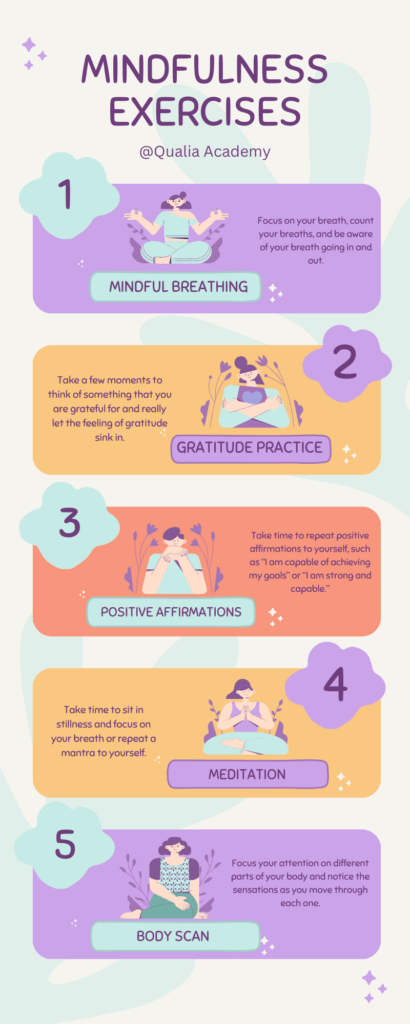Self-Love day
What is it?
Self-Love Day is a day dedicated to promoting and celebrating the practice of self-love and self-care. It’s an opportunity for individuals to focus on nurturing themselves, both mentally and physically, and acknowledging the importance of their own well-being.
Self-love involves treating yourself with kindness, compassion, and acceptance. It’s about recognising your worth, acknowledging your strengths and weaknesses, and making choices that prioritise your happiness and fulfilment.
Self-Love Day serves as a reminder that taking care of yourself is not selfish but essential for leading a fulfilling and balanced life. It encourages individuals to practice self-compassion and embrace their own unique journey towards self-discovery and personal growth.

The importance of having a healthy relationship with yourself
Having a healthy relationship with yourself is fundamental to overall well-being and can significantly impact various aspects of your life. Here are some key reasons why cultivating a positive and nurturing relationship with yourself is important:
1. Improved Mental Health:
– A healthy self-relationship contributes to better mental health. It involves self-acceptance, self-compassion, and the ability to manage stress and challenges effectively.
2. Enhanced Emotional Resilience:
– When you have a strong connection with yourself, you are better equipped to navigate and cope with life’s ups and downs. This emotional resilience helps you bounce back from setbacks more effectively.
3. Increased Self-Esteem and Confidence:
– A positive self-relationship fosters higher self-esteem and confidence. You are more likely to believe in your abilities and value your worth, leading to a greater sense of empowerment.
4. Better Decision-Making:
– Understanding yourself and your values allows for more authentic decision-making. When you have a clear sense of who you are, you can make choices that align with your goals and aspirations.
5. Healthy Relationships with Others:
– Building a healthy relationship with yourself forms a strong foundation for healthy relationships with others. It enables you to communicate more effectively, set boundaries, and engage in relationships that are mutually beneficial.
6. Increased Productivity and Goal Achievement:
– A positive self-relationship fosters a growth mindset and motivation. You are more likely to set and pursue goals, persist through challenges, and celebrate your achievements along the way.
7. Better Physical Health:
– Emotional and mental well-being is interconnected with physical health. Stress management, self-care, and a positive mindset contribute to better physical health outcomes.
8. Reduced Negative Self-Talk:
– A healthy relationship with yourself involves treating yourself with kindness and understanding. This reduces negative self-talk and self-criticism, promoting a more positive internal dialogue.
9. Increased Life Satisfaction:
– Individuals with a healthy self-relationship often report higher levels of life satisfaction. They are more likely to find fulfilment in various aspects of life, leading to a more positive overall experience.
10. Personal Growth and Development:
– A positive self-relationship encourages continuous personal growth and development. It involves a willingness to learn, adapt, and evolve, leading to a more fulfilling and purposeful life.
11. Resilience in Adversity:
– When faced with challenges, having a healthy relationship with yourself provides a source of inner strength and resilience. You can approach difficulties with a more positive mindset, seeking solutions and learning from experiences.
In summary, a healthy relationship with yourself forms the cornerstone of a fulfilling and balanced life. It influences your mental and emotional well-being, shapes your interactions with others, and contributes to overall life satisfaction. Cultivating self-love and self-care is an investment in your holistic health and personal growth.
Ways to give yourself love
Self-love is a crucial aspect of overall well-being, and there are various ways you can practice and cultivate it. Here are some ideas to help you give yourself the love and care you deserve:
1. Positive Affirmations:
– Repeat positive affirmations daily to reinforce self-love and boost your confidence.
– Examples: “I am worthy of love and happiness,” “I am enough just as I am.”
2. Self-Compassion:
– Treat yourself with the same kindness and understanding you would offer to a friend.
– Acknowledge and validate your feelings without judgment.
3. Self-Care Rituals:
– Establish regular self-care routines, such as taking relaxing baths, practicing skincare, or enjoying a cup of tea.
– Prioritise activities that bring you joy and relaxation.
4. Mindfulness and Meditation:
– Practice mindfulness to stay present and cultivate a deeper connection with yourself.
– Engage in meditation to calm your mind and reduce stress.
5. Set Boundaries:
– Learn to say no to commitments that may overwhelm you.
– Establish healthy boundaries to protect your time and energy.
6. Celebrate Achievements:
– Acknowledge and celebrate your accomplishments, no matter how small.
– Keep a journal to document your successes and progress.
7. Nourish Your Body:
– Eat a balanced and nutritious diet that fuels your body and mind.
– Stay hydrated and pay attention to your body’s needs.
8. Physical Activity:
– Engage in exercise or physical activities that you enjoy.
– Focus on how movement makes you feel rather than solely on achieving specific fitness goals.
9. Express Yourself Creatively:
– Explore your creative side through art, writing, music, or any form of self-expression.
– Allow yourself the freedom to create without judgment.
10. Positive Relationships:
– Surround yourself with supportive and positive people.
– Let go of toxic relationships that drain your energy and self-esteem.
11. Learning and Growth:
– Invest time in activities that contribute to your personal and professional growth.
– Take on challenges and embrace opportunities for learning.
12. Unplug and Rest:
– Take breaks from technology and allow yourself moments of rest and relaxation.
– Ensure you get enough quality sleep to rejuvenate your body and mind.
Remember that self-love is an ongoing practice, and it’s okay to adapt these suggestions to fit your unique needs and preferences. Consistently incorporating these habits into your life can contribute to a healthier and more positive relationship with yourself.
Mindfulness and Self Love
Mindfulness and self-love share an intricate connection, forming a symbiotic relationship that cultivates a deep and compassionate understanding of oneself. At its core, mindfulness invites individuals to anchor their awareness in the present moment, fostering an acute and non-judgmental observation of thoughts, emotions, and experiences. This heightened awareness becomes a powerful tool in the journey toward self-love, as it allows individuals to recognise and understand the patterns of their inner dialogue. By embracing the present without harsh judgment, mindfulness creates a space for self-acceptance, a cornerstone of self-love.

In the practice of mindfulness, individuals learn to approach their thoughts and emotions with curiosity rather than criticism. This shift in perspective is fundamental to self-love, as it encourages a gentle exploration of one’s inner world. The non-judgmental stance promoted by mindfulness becomes a pathway to self-compassion, enabling individuals to treat themselves with the same kindness they would extend to a friend. As individuals become attuned to their thoughts and feelings, they can identify and challenge negative self-talk, replacing it with affirmations and a more positive internal narrative.
Furthermore, mindfulness empowers individuals to appreciate the richness of each moment and acknowledge their own worth. The practice teaches that self-love is not contingent upon external validation or future achievements but is an inherent aspect of one’s being. Mindfulness helps individuals let go of regrets about the past and anxieties about the future, anchoring them in the present where self-love can thrive.
Ultimately, the mindful journey towards self-love involves a continuous process of self-discovery, acceptance, and nurturing. By embracing mindfulness, individuals embark on a transformative path that encourages self-awareness, kindness, and a genuine appreciation for the unique and evolving tapestry of their own existence. In the union of mindfulness and self-love, individuals discover the profound beauty that emerges when they wholeheartedly embrace and cherish themselves in the present moment.
Mindfulness is often associated with meditation and rooted in ancient contemplative traditions, particularly within Buddhism. Mindfulness emphasizes awareness of thoughts, feelings, sensations, and the surrounding environment without getting caught up in them.
In the context of self-love, mindfulness can be a powerful tool for fostering a positive and compassionate relationship with oneself. Here’s how mindfulness can contribute to self-love:
- Increased Self-Awareness: Mindfulness encourages a heightened awareness of your thoughts and emotions. By being present in the moment, you can observe and understand your thoughts and feelings without immediately reacting to them. This self-awareness is crucial for cultivating self-love because it allows you to recognise negative self-talk or harmful patterns.
- Non-Judgmental Observation: Mindfulness promotes a non-judgmental attitude towards one’s experiences. Instead of harshly criticising yourself for perceived shortcomings or mistakes, mindfulness encourages you to observe these thoughts without attaching negative judgments. This non-judgmental stance helps reduce self-criticism and fosters a more compassionate relationship with oneself.
- Acceptance of Imperfections: Mindfulness teaches acceptance of the present moment, including acceptance of oneself with all their imperfections. Rather than striving for an idealised version of yourself, mindfulness encourages acceptance of who you are at this moment, acknowledging both strengths and areas for growth.
- Reduced Stress and Anxiety: Mindfulness practices, such as meditation, have been shown to reduce stress and anxiety. By managing these negative emotions, individuals can create a mental space that allows for self-reflection and self-love to flourish.
- Improved Emotional Regulation: Mindfulness helps individuals develop better emotional regulation by creating a pause between stimulus and response. This pause allows for a more thoughtful and intentional reaction to situations, which can prevent impulsive and self-destructive behaviors.
- Gratitude and Appreciation: Mindfulness often involves cultivating gratitude for the present moment and the positive aspects of one’s life. This shift in focus towards gratitude can contribute to a more positive self-image and an appreciation for one’s achievements and strengths.
- Connection to the Present: Instead of dwelling on past regrets or worrying about the future, mindfulness grounds individuals in the present. This can alleviate unnecessary stress and promote a sense of peace, making it easier to appreciate and love oneself in the current moment.
In summary, mindfulness can be a valuable tool in developing self-love by promoting self-awareness, non-judgmental observation, acceptance, stress reduction, improved emotional regulation, gratitude, and a connection to the present moment. Incorporating mindfulness practices into daily life can contribute to a more positive and compassionate relationship with oneself.
Process for Mindfulness
Certainly! Here’s a step-by-step process for practicing self-love using mindfulness, along with items to help remember the good times:
- Start with Mindful Breathing:
- Find a quiet and comfortable space.
- Sit or lie down in a relaxed position.
- Close your eyes and focus on your breath.
- Inhale deeply, feeling your lungs fill with air, and exhale slowly.
- Pay attention to the sensation of your breath, bringing your mind to the present moment.
- Body Scan Meditation:
- Shift your attention to different parts of your body.
- Notice any tension or discomfort, and breathe into those areas to release tension.
- As you scan, cultivate a sense of gratitude for each part of your body that allows you to experience life.
- Reflect on Positive Memories:
- Recall moments in your life when you felt joy, accomplishment, or love.
- Visualise these memories vividly, engaging your senses.
- Identify specific details – sights, sounds, smells – to make the memories more vivid.
- Create a Gratitude Journal:
- Keep a journal to jot down positive experiences and things you’re grateful for.
- Write a daily or weekly entry focusing on the good moments, achievements, or qualities you appreciate about yourself.
- Mindful Appreciation Exercise:
- Take a moment to appreciate your current surroundings.
- Notice the colors, textures, and sounds around you.
- Acknowledge the positive aspects of your environment, fostering gratitude for the present.
- Loving-Kindness Meditation:
- Direct loving-kindness towards yourself and others.
- Repeat phrases like “May I be happy, may I be healthy, may I be at peace” in your mind.
- Extend these wishes to others in your life, creating a positive, compassionate mindset.
- Use Reminders for Positive Affirmations:
- Create a list of positive affirmations about yourself.
- Write these affirmations on sticky notes or set them as reminders on your phone.
- Place these notes in visible locations, serving as daily reminders of your strengths and positive qualities.
- Mindful Appreciation Jar:
- Get a jar and small pieces of paper.
- Whenever you experience a positive moment, write it down on a piece of paper.
- Fold the paper and put it in the jar.
- When you need a boost, revisit the jar and read the notes to remind yourself of the good times.
- Express Self-Love Through Self-Care:
- Engage in activities that nurture your well-being, whether it’s a warm bath, a nature walk, or quiet meditation.
- Treat yourself with kindness and prioritise self-care regularly.
- Regular Check-Ins:
- Schedule regular check-ins with yourself to reflect on your progress.
- Adjust your mindfulness practices based on what works best for you.
Consistency is key in building a foundation of self-love through mindfulness. By incorporating these practices into your routine, you can foster a positive and compassionate relationship with yourself, emphasising gratitude, mindfulness, and appreciation for the good times in your life.










